Related Research Articles

The Grapes of Wrath is an American realist novel written by John Steinbeck and published in 1939. The book won the National Book Award and Pulitzer Prize for fiction, and it was cited prominently when Steinbeck was awarded the Nobel Prize in 1962.

Of Human Hearts is a 1938 American drama film directed by Clarence Brown and starring Walter Huston, James Stewart and Beulah Bondi. Stewart plays a proud and ungrateful son who rebels against his preacher father and neglects his poverty-stricken mother. Bondi was nominated for the Academy Award for Best Supporting Actress.

The Grapes of Wrath is a 1940 American drama film directed by John Ford. It was based on John Steinbeck's 1939 Pulitzer Prize-winning novel of the same name. The screenplay was written by Nunnally Johnson and the executive producer was Darryl F. Zanuck.

Athalia is an English-language oratorio composed by George Frideric Handel to a libretto by Samuel Humphreys based on the play Athalie by Jean Racine. The work was commissioned in 1733 for the Publick Act in Oxford – a commencement ceremony of the University of Oxford, which had offered Handel an honorary doctorate. The story is based on that of the Biblical queen Athaliah. Athalia, Handel's third oratorio in English, was completed on 7 June 1733, and first performed on 10 July 1733 at the Sheldonian Theatre in Oxford. The Bee reported that the performance was "performed with the utmost Applause, and is esteemed equal to the most celebrated of that Gentleman's Performances: there were 3700 Persons present".

Firelight is a 1997 period romance film written and directed by William Nicholson and starring Sophie Marceau and Stephen Dillane. Written by William Nicholson, the film is about a woman who agrees to bear the child of an anonymous English landowner in return for payment to resolve her father's debts. When the child is born, the woman gives up the child as agreed. Seven years later, the woman is hired as a governess to a girl on a remote Sussex estate, whose father is the anonymous landowner. Filmed on location in Firle, England and Calvados, France, the film premiered at the Deauville American Film Festival on 14 September 1997. Firelight was Nicholson's first film as a director.
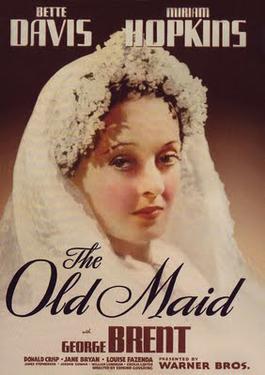
The Old Maid is a 1939 American drama film directed by Edmund Goulding. The screenplay by Casey Robinson is based on the 1935 Pulitzer Prize-winning play of the same name by Zoë Akins, which was adapted from the 1924 Edith Wharton novella The Old Maid: the Fifties.

Night of the Eagle is a 1962 British horror film directed by Sidney Hayers. The script by Charles Beaumont, Richard Matheson and George Baxt was based upon the 1943 Fritz Leiber novel Conjure Wife. The film was retitled Burn, Witch, Burn! for the US release.

Tarnished Lady is a 1931 American pre-Code drama film directed by George Cukor and starring Tallulah Bankhead and Clive Brook. The screenplay by Donald Ogden Stewart is based on his short story, A Story of a New York Lady.
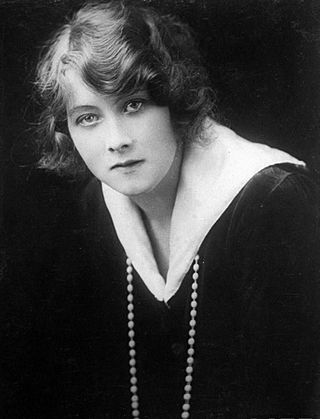
Alma Louise Taylor was a British actress.
The Narrow Valley is a 1921 British silent drama film directed by Cecil Hepworth. As of August 2010, the film is missing from the BFI National Archive, and is listed as one of the British Film Institute's "75 Most Wanted" lost films.
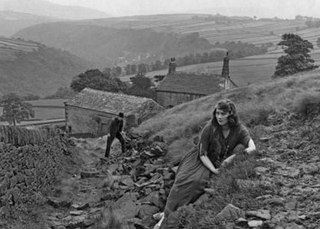
Helen of Four Gates is a 1920 British silent melodrama film directed by cinema pioneer Cecil Hepworth and starring Alma Taylor, James Carew, and Gerald Ames.
Comin' Thro the Rye is a 1923 British silent drama film directed by Cecil Hepworth and starring Alma Taylor and Ralph Forbes. The film was based on the 1875 novel of the same name by Helen Mathers. The title alludes to the Robert Burns 1782 poem "Comin' Through the Rye".
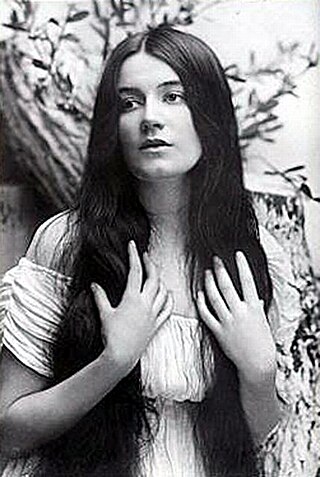
Violet Hopson was an actress and producer who achieved fame on the British stage and in British silent films. She was born Elma Kate Victoria Karkeek in Port Augusta, South Australia on 16 December 1887. Violet Hopson was her stage name, while in childhood she was known as Kate or Kitty to her family.
Eileen Dennes was an Irish-born actress of the silent era.
Hepworth Picture Plays was a British film production company active during the silent era. Founded in 1897 by the cinema pioneer Cecil Hepworth, it was based at Walton Studios west of London.

Alf's Button is a 1920 British silent comedy film directed by Cecil Hepworth and starring Leslie Henson, Alma Taylor and Gerald Ames. It was based on the 1920 novel Alf's Button by William Darlington. The film is about a British soldier who discovers a magic coat button which summons a genie to grant his various wishes. It was remade as a sound film in 1930.
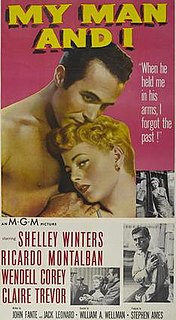
My Man and I is a 1952 American drama film directed by William Wellman, about an ambitious Mexican immigrant farm laborer, who falls in love with an alcoholic waitress despite being pursued by the beautiful wife of his boss.
The Nature of the Beast is a 1919 British silent drama film directed by Cecil M. Hepworth and starring Alma Taylor, Gerald Ames and James Carew. The screenplay concerns a Belgian refugee who marries a British aircraft manufacturer. It was based on a 1918 novel of the same title by E. Temple Thurston.
Boundary House is a 1918 British silent drama film directed by Cecil M. Hepworth and starring Alma Taylor, Gerald Ames and William Felton.
The Tinted Venus is a 1921 British silent fantasy film directed by Cecil Hepworth and starring Alma Taylor, George Dewhurst and Maud Cressall.
References
- ↑ Tansy (1921) Petley, Julian. BFI Screen Online. Retrieved 2 October 2010